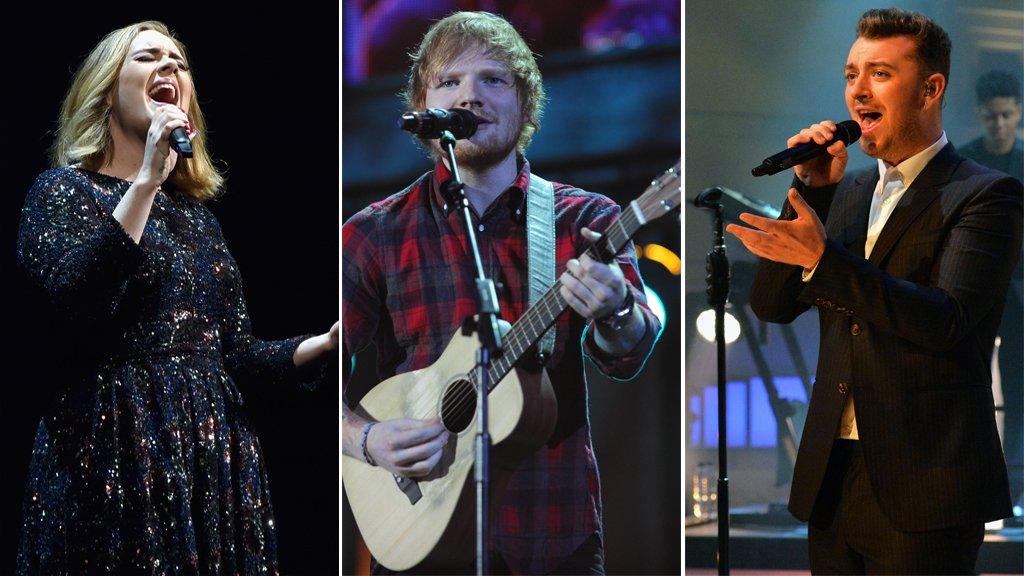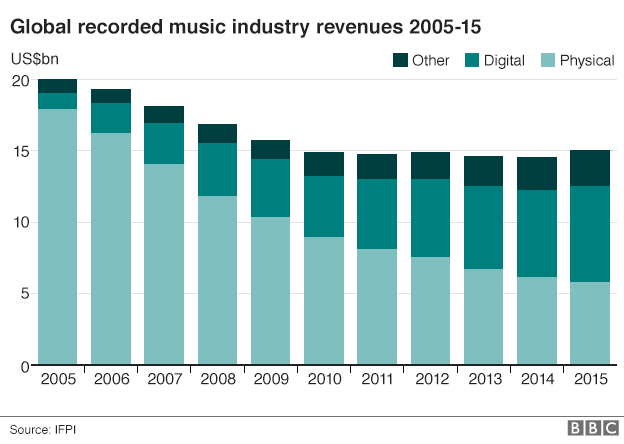British stars spur music industry growth
- Published

Adele, Ed Sheeran and Sam Smith were among the top 10 best-selling artists of 2015
British artists including Sam Smith, Ed Sheeran and Adele have helped the music industry return to meaningful growth for the first time in almost 20 years.
British artists accounted for five of the top 10 selling albums last year, as the global music industry generated $15bn (£10.5bn).
Overall, revenues grew 3.2%, reversing a 0.4% decline in 2014.
And digital music overtook physical records as the primary source of income for the first time.
Downloads and streaming accounted for 45% of revenue, ahead of CD and vinyl on 39%. The remaining income was generated by royalty payments and licensing music to film, TV and video games.
"The most striking feature of the recovery is its global nature," said Stu Bergen, president of Warner Music, one of the world's three major labels.
He said streaming and social media meant music was being shared in unprecedented ways.
"We're seeing geographic boundaries being dissolved and artists breaking around the world with astonishing speed.
Mr Bergen cited the example of Danish band Lukas Graham, whose single 7 Years has become a global hit without the band needing to travel to promote it.
"I predict we'll see far more diversity and nationalities in the mainstream charts in the coming years," he told the BBC.

Lukas Graham spent five weeks at number one in the UK and are currently in the US top 10, after their song became a viral hit
After years of uncertainty and confusion over digital music, streaming appears to have rescued the industry from decades of decline.
An estimated 68 million people worldwide now pay for a music subscription service, the International Federation of the Phonographic Industry (IFPI) said, up from 41 million in 2014 and eight million when data was first compiled in 2010.
Helped by the spread of smartphones and a proliferation of services - including Spotify, Deezer, Tidal and Apple Music - streaming now represents 19% of the music industry's income, up from 14% in 2014.
In the US, 317 billion songs were streamed in 2015, while the UK figure was 25 billion.
The figures helped offset declines in both digital downloads and physical sales.

However, the music market is still worth significantly less than at the turn of the millennium, when revenues were $27.8bn (£19.4bn).
Sony Music chairman Edgar Berger told the BBC that, at the current rate of growth, it would take the music business "10 years to reach that market level" again.
"The music industry is performing way below its potential," he added.
Mis-match
The IFPI agrees there is a disparity between the amount of music being consumed online and the money being returned to artists, record labels and producers.
This difference - which the IFPI calls the "value gap" - has increased due to the growing popularity of music being streamed on services supported by advertisements, such as YouTube, SoundCloud and Daily Motion. They can claim exemption from normal rules about licensing when content is uploaded by users.
Mr Berger told the BBC such services which "comprise more than 900 million users, are generating only 4% of our revenues - that is a gigantic mis-match".
The IFPI said it would need intervention from policy-makers around the world to help turn the situation around.
In response to the IFPI's comments, YouTube's parent company, Google, told the BBC it was paying its way.
"To date, Google has paid out over $3bn (£2.1bn) to the music industry - and that number is growing significantly year on year," it said in a statement.
"Only about 20% of people are historically willing to pay for music. YouTube is helping artists and labels monetise the remaining 80% that were not previously monetised. The global advertising market is worth $200bn (£140bn). This is a tremendous opportunity."
